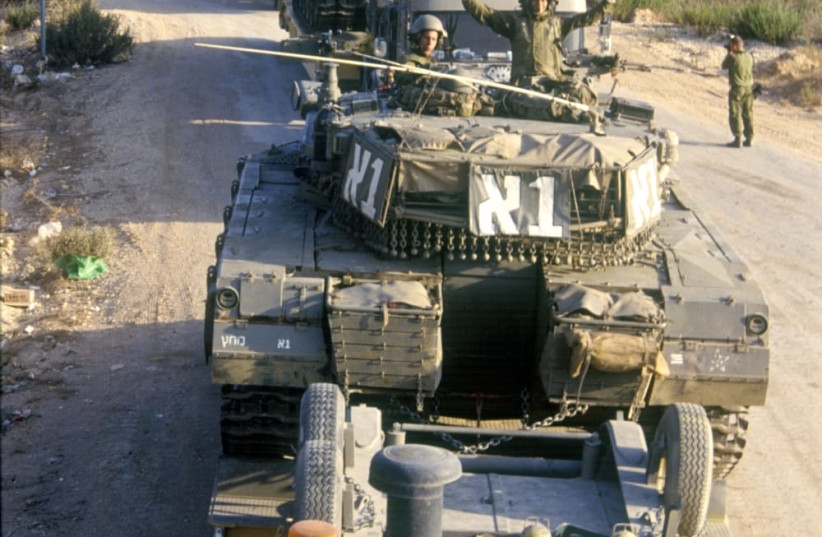July 25, 2022 marks 29 years since the start of Operation Accountability, a week-long IDF attack against Lebanon-based Hezbollah.
Operation Accountability itself is remembered in Lebanon as the Seven-Day War, and was launched to fight Hezbollah and to secure southern Lebanon in order to prevent it from being used as a launching point for terrorist attacks against Israel.
<br>Background
The operation itself can be traced back to the events of the Lebanese Civil War, a long and bloody conflict that stretched from 1975 until 1990.
During this conflict, Israel, for a number of reasons, invaded Lebanon in what has become known as the First Lebanon War. This invasion sparked the formation of several armed groups in Lebanon. One of these was Hezbollah, which was formed from the Lebanese Shi'ite Muslim sector and received support from Iran and Syria.
While the ending of the civil war was supposed to have ended the existence of these armed groups, Hezbollah didn't disperse, with it being considered a "resistance movement against the Israeli occupation" following an extensive political and public relations campaign.

However, Israel wasn't satisfied with this, especially considering Hezbollah's expressed opposition to Israel.
In the immediate days leading up to the conflict, there were a few sporadic clashes. Specifically, according to the IDF, Hezbollah had attacked the IDF for three days before it began, including the firing of 40 Katyusha rockets This resulted in the killing of one IDF soldier and the wounding of another. Before that, the IDF claims a number of soldiers were killed driving over bombs placed by Hezbollah.
This all took place after Hezbollah was warned for two weeks to not fire rockets into Israel from southern Lebanon, according to the IDF.
<br>The refugee angle
Another possible factor and goal in Operation Accountability was the alleged deliberate displacement of citizens and refugees.
According to a Human Rights Watch report, Israel deliberately sought to create a massive refugee flow toward Beirut. The purpose of this was supposed to pressure the Lebanese government into dissolving Hezbollah and keep it from being a threat.
<br>Operation Accountability
The IDF began launching Israel Air Force (IAF) aircraft to attack Hezbollah targets. This included carrying out strikes on villages where Hezbollah was based.
IDF artillery were also mobilized and used to hammer on Hezbollah positions.
All the while, Hezbollah was able to fire rockets into Israel as well. The fighting would ultimately last just six days before a ceasefire was established.
"Hezbollah is responsible for the suffering caused to the civilian population which is being driven out of its homes because it continues firing at us from inside and from the outskirts of Lebanese villages."
Ehud Barak
<br>Violating international law
Human Rights Watch condemned both Israel and Hezbollah of violating international laws during the conflict.
For Israel, the crime in question was the alleged intentional targeting of civilians in order to forcibly displace them as refugees.
For Hezbollah, the crime was indiscriminately firing Katyusha rockets across the border.
Israel, it should be noted, has claimed that it made efforts to shield civilians by warning them in advance. Human Rights Watch, however, countered this by saying it was "reasonable to assume that the intention was, in fact, to sow terror among the civilian population."
Further, Human Rights Watch argued that issuing warnings with the intent of causing terror is a further violation of international law.
Hezbollah also claimed to have been fighting to free the area from Israel, but also attempted to cause civilian casualties and damage civilian infrastructure.
This ended up not having as much of an impact, and the damage was limited, though it has been argued that the main intention was to terrorize northern Israel's residents.
Overall, Israel blamed all civilian casualties on Hezbollah, since they also fired from within or around civilian populations.
"We believe that those elements who...fire at us from within civilian settlements are responsible for the civilian casualties," then-IDF chief of staff Ehud Barak said a day after the operation began. "Hezbollah is responsible for the suffering caused to the civilian population which is being driven out of its homes because it continues firing at us from inside and from the outskirts of Lebanese villages."
<br>Aftermath
The conflict saw a large number of injured and displaced civilians, while the actual number of IDF troops and Hezbollah fighters remained low by comparison.
But ultimately, it came to an end with a ceasefire negotiated by then-US secretary of state Warren Christopher.
This agreement, however, would not last long. Just three years later, the IDF would launch another operation in Lebanon, Operation Grapes of Wrath - a conflict that, like Operation Accountability, was seen by many as ultimately further legitimizing Hezbollah operations against Israel in the area.
